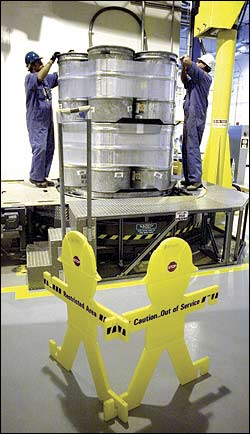Whatever happened to I-297? That was the initiative approved a year ago by nearly 70 percent of state voters. It mandated that no additional radioactive or chemically dangerous waste be imported to Eastern Washington’s Hanford Nuclear Reservation until the existing mess is cleaned up. That existing mess is one of the most contaminated patches of land in the western hemisphere. The cleanup is proceeding slowly, with the federal Department of Energy, operator of Hanford, having $295 million less in its 2006 cleanup budget than it did in 2005.
I-297 passed by the largest margin of any statewide initiative in Washington history. But a year later, the initiative known as the Clean-Up Priority Act remains unenforced, tied up in the U.S. District Court of Judge Alan McDonald of Yakima. The Department of Energy is paying for the lawsuit of Hanford contractor Fluor Hanford and the Tri-City Industrial Development Council (TRIDEC) to try to stymie the will of voters and stop the Clean-Up Act from becoming law.
“In the end, we’ll have I-297 upheld,” says Gerry Pollet, longtime executive director of Heart of America Northwest, the watchdog group that sponsored I-297. “But the schedule is such that we won’t be out of U.S. District Court for nearly a year, and then another year for the 9th Circuit Court of Appeals.” McDonald is to hear arguments in the case May 23.
Meanwhile, there is nothing to prevent the office of Republican state Attorney General Rob McKenna from enforcing the act right now, but it has declined to do so. Thus, it’s in the interest of Department of Energy officials to drag the legal case out for as long as possible. While the act remains in limbo, the feds have proceeded with a plan for a massive new National Radioactive Waste Dump at Hanford. “The landfill will be dug and open before there’s a court hearing in May,” says Pollet. “If this was a big priority of the attorney general’s office, they’d implement it.”
So far, courts have sided with the voters. July 28, the state Supreme Court ruled that I-297 did not regulate “pure” radioactive materials, like those used for medical research, and that it did not prevent the movement of waste on site—two key arguments of initiative opponents. But the court kept alive the contention that the act might regulate materials that are both radioactive and have hazardous or toxic substances in them. According to Pollet, that’s what’s keeping the federal lawsuit going.
U.S. Department of Justice attorneys, in a motion filed Nov. 1 seeking summary judgment against the act, offered a host of other legal arguments. The act would “not only interfere with a nationwide plan that calls for storing or disposing of certain radioactive wastes at Hanford, but also would disrupt national security research being done at Pacific Northwest National Laboratory and undermine the Navy’s ability to maintain and decommission nuclear submarines,” according to court documents. The feds also argue that the act was an attempt by the state to usurp federal authority in regulating nuclear material essential to national security and violates the U.S. Constitution’s Supremacy and Commerce clauses.
Pollet is confident the state will eventually prevail in the court case. But he argues that the Legislature could render most of the lawsuit moot by passing a law to clarify the limited scope of the act. Seattle legislator Adam Kline pushed such a bill this year, and it passed with bipartisan support of two-thirds of the Senate. But the bill stalled in the House, held up by a representative from the Tri-Cities who cut a deal to prevent it from ever coming up for a vote. Pollet hopes for better luck in the 2006 session. “Contractors are fighting tooth and nail to prevent the Legislature from adopting that,” he says. “We just have to hope we’ll be allowed to have a vote in the state House.”
None of this should obscure the fact that the state of Washington could implement the provisions of I-297 right now, if it wanted to. At an annual “State of the Site” hearing in Seattle Nov. 2, nearly three hours’ worth of testimony poured from concerned citizens, who were virtually unanimous in their demand that Hanford clean up the existing mess before fouling the nest further. Near the end of the evening, state Department of Ecology Director Jay Manning announced that he agreed with the “cleanup first” philosophy—a statement Pollet characterizes as “kind of a breakthrough.”
Now, the trick is to get other state officials, particularly McKenna and party leaders in the House, to sign off on the act. Initiative professional Tim Eyman, oddly enough, is something of a model here. When state officials try to ignore or circumvent his tax-cutting measures, he rallies supporters and raises holy hell. Perhaps that sort of pressure is needed for Hanford cleanup, too. The principle is the same: a mandate passed by an overwhelming majority deserves to be honored by the state and federal governments.







